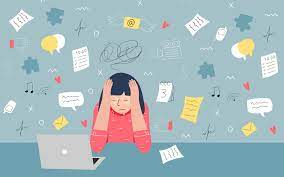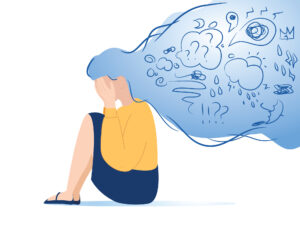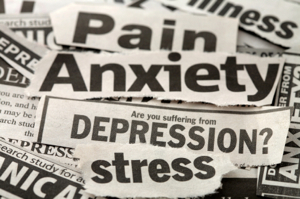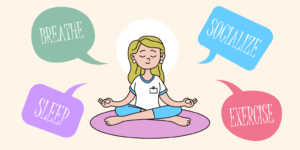Contents
What is Stress?

Stress is a natural response to any type of event in your life. It can be triggered by anything ranging from work, family, school, health, and so on. It can be any response be it physical, mental, or emotional. The problem with it is that it’s not always easy to recognize the symptoms or know how to treat them. There are many different types of stress, and they can have a huge impact on your health. It is not always negative – some people find it motivating while others use it as an excuse to avoid responsibility.
However, if you feel that the stress in your life is negatively impacting your mental or physical wellbeing, there are steps you can take to improve this situation. Learning about stress will help you recognize what triggers it and how best to treat it.
Types of Stress
There are mainly two different types of stress, and they can have a huge impact on your health. These two types are:
Acute Stress

Acute stress is a type that doesn’t cause much damage to the body, but if experienced too often can cause health problems. It is the most common type of stress. This can be caused by life-changing events such as marriage, divorce, or even the birth of a child. Acute stress is also experienced at work – deadlines and tough projects often cause short-term problems for your health.
Another example would be if you were mugged on your way to lunch one day; this could lead you to feel anxious walking home that evening because it was an unpleasant experience.
Chronic Stress

This type of stress has been linked with numerous physical issues including cardiovascular disease, gastrointestinal disorders, respiratory conditions along with mental ones like depression and anxiety disorder. It’s important not only to recognize how much our bodies have changed since the digital age but to also think carefully about how we are reacting to the situations that arise around us. It is caused by ongoing problems in life such as financial difficulties, unemployment, or prolonged illness.
The most prevalent chronic diseases which can be linked to long-term exposure to stress include heart disease and depression.
How Do You Know That You Have Stress?
Symptoms of stress may vary from person to person, however, there are a few common symptoms that can be helpful in recognizing if you have an issue with excessive levels of stress. These symptoms are:
Inability to Concentrate/Focus
Due to stress, people are not able to focus on the task at hand, which could lead to poor work or school performance.
Difficulty in Making Decisions
People who are excessively stressed can find themselves struggling with even simple day-to-day tasks like deciding what they want for dinner.
Insomnia/Fatigue

Insomnia is often caused by difficulty sleeping due to stress and worrying about things that happened during the day etc.
Aches and Pains
Stress puts pressure on the body, which can cause headaches or bodily pain.
Changes in Appetite
It’s common to see people experiencing increased or decreased appetite when they are stressed. Either they start eating a lot or there is a sudden decrease in the food they eat.
Social Withdrawal/Isolation
Feeling overwhelmed by stress can cause a person to withdraw from their friends and family, which could have a negative impact on personal relationships etc.,
Drastic Mood Swings
People who experience extreme levels of stress may also notice changes in how irritable or angry they feel for no reason. This is often accompanied by anxiety symptoms such as feeling restless, trouble concentrating, etc.
What Causes Stress?
It can have an effect on your health and overall well-being, so it’s important to know what causes stress for you personally. These are some of the causes of Stress:
Excessive Working

This can be a reason for many people. Working a lot can cause stress and make you feel like there is no time for yourself, which makes it even worse.
Personal Life Issues
Sometimes there are issues you just can’t control. If they’re bothering you, it might be time to seek help or do something about them.
Family Problems
Most people have some sort of family problem that can cause it. This is why many relationships break up because the two parties cannot deal with their respective families’ needs and demands.
Lack of Sleep
If you aren’t getting enough sleep each night, this could lead to a lot more of it in your life. Try going to bed earlier if possible, which will make for better sleeping habits overall.
Uncertain about Future Jobs and Other Related Issues.
Jobs can cause a lot of stress. Whether you feel like your job isn’t as fulfilling as it should be, or if the company is going through some changes and everything seems uncertain, this can cause a lot of stress.
Not Knowing What to Expect Next
This one definitely applies more in life situations than work ones. Not knowing what’s coming up for you tomorrow, whether that’s at school or outside of it (i.e., meeting new people) can really make things stressful.
Unsupportive Friends and Family

Do you know those times when everyone around you doesn’t seem supportive? While we may think they’re supposed to be there for us no matter what happens, sometimes their opinions about our decisions aren’t helpful at all. This can definitely cause someone other stress.
How does Stress Affect Your Body?
It’s important to remember stress has a serious impact on our mental health as well as physical health – both of which need attention and care. Some of these after-effects are:
Chest Pain/Heart Palpitations

Chronic stress usually has a negative effect on your heart health and many people experience chest pain as well as irregular heartbeats when they are constantly stressed etc.
Stomach Issues
Stress is known that causes stomach problems such as abdominal pain or cramps. It could also trigger conditions like irritable bowel syndrome where a person experiences severe diarrhea etc.
Loss of Sexual Desire
When you’re stressed out your body releases cortisol – the stress hormone. This in turn reduces testosterone levels (the sex hormones) and suppresses libido.
Weight Gain
This is often caused by stress-eating. When you’re feeling anxious and worried your body releases cortisol, which leads to cravings for junk food etc.,
Tension/Headaches
Chronic stress can increase muscle tension in the neck, back, and shoulders. This may result in headaches etc.
Anxiety/Depression

This is often caused by excessive levels of worry about things that may happen in the future. It’s important to remember if you’re feeling anxious more than usual it could be due to elevated levels of it. People who suffer from depression also tend to have higher rates of anxiety because their ability to cope with life stresses is already impaired through low moods etc. Depression not only affects someone emotionally but also physically, which can lead to lack of energy, feelings of hopelessness and thoughts of suicide, etc.,
When Does It Become a Problem?
Everyone experiences some level of stress in their lives, and it can actually be beneficial as it motivates you towards achieving your goals; however chronic levels of high stress could lead to health problems like anxiety or depression. The key is striking a balance between healthy amounts of pressure (acute) along downtime for our bodies and minds. This way, you will feel happier, more productive at work or school, etc., plus improve your overall well-being too! Stressful jobs like those involving long hours – nights, weekends, etc. often mean working under stressful conditions which leads to even more anxiety.
When to Visit a Doctor?

If experiencing one or more of these symptoms after a traumatic event it’s best to speak with your doctor about treatment options which could include lifestyle changes as well as medications. The first step towards diagnosis involves doing some research into what areas need improvement within one’s life so that you can learn how not only to improve your quality of life but also those around you.
The doctor can diagnose it by asking questions about your life, physical symptoms, and how you handle it. There are some tests that can help rule out other conditions and determine if you’re at risk for stress.
How Can You Treat Stress?
After the diagnosis, Doctors might recommend some lifestyle changes including certain medications or other forms of therapy depending on individual circumstances, There are some methods through which you can manage your stress such as:
Medications
Some people find that medications can help them manage their stress. If you’re interested in taking medication as a treatment for your stress, talk to your doctor about what might work best for you
Therapy
It is also common for people to receive help from therapists who can provide recommendations, guidance, and support throughout this process. There are types of therapies that can be helpful for people who are struggling to manage it. These therapies are Cognitive Behavioral Therapy (CBT), Dialectical Behavior Therapy (DBT), and Mindfulness-Based Stress Reduction. These are mostly used to treat specific types of stress, including post-traumatic stress disorder (PTSD), panic disorder, and social anxiety.
Stress Management Techniques

These are some of the tricks to manage stress:
- Exercise Regularly– One of the most important steps that you can take to manage stress is to exercise regularly. It releases endorphins and improves mood throughout the day by providing energy. Some examples include yoga, jogging, or Zumba! Make sure it’s something enjoyable so that you’ll actually want to do it! You should aim for at least 30 minutes of exercise every day but try not to go more than an hour without a break.
- Eat Good Food – Eating healthy is one of the most important things you can do to reduce stress! Make sure you’re getting enough proteins, vitamins, and minerals. It’s also necessary that you stay hydrated throughout the day with water or other non-caffeinated drinks. Some great examples are black tea, green tea, or coconut water.
- Get Plenty of Sleep – This is another thing that can help your body to function properly! When we don’t get enough sleep it impacts our memory, mood, and energy levels. It’s also been shown to impact bodyweight – meaning you’ll have a higher chance of being overweight or obese.
Conclusion
People are often stressed for many reasons. It can lead to anxiety, depression, and health issues like heart disease or high blood pressure which is why it’s important to manage your stress levels in order to enjoy a happier life. There are plenty of ways you can reduce the amount of stress in your life by managing what stresses you out with some simple lifestyle changes. It might take time but these small steps will help improve quality of life over time while also reducing any risk factors associated with chronic stress conditions.
For more information, please contact MantraCare. Stress can have both physical and mental effects on the body, leading to negative consequences such as anxiety, depression, and even physical illnesses. If you have any queries regarding Online Stress Counseling experienced therapists at MantraCare can help: Book a trial Stress therapy session


